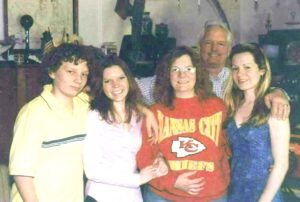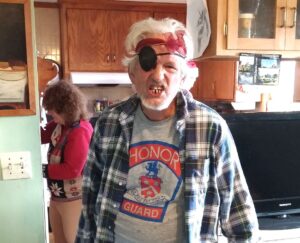I first met Ross Taggart outside the house to which I had just brought my then-three-year-old son to spend an evening while I went on a date. The fellow with whom I would be having dinner stood a few feet away as Katrina introduced me to her husband. We watched their son and mine scamper across the yard. Ross glanced over my shoulder and said, by way of greeting, Are you sure you want to do this?
I laughed; but of course, he turned out to be correct and the man in question broke my heart a few months later. Two marriages, two divorces, and nearly three decades later, I wonder at the prescience of that simple query.
Over the years, Ross and I had a few clashes. I can’t recall the substance of most of them now. The anger that one or the other of us felt has washed away like driftwood buoyed by the waves of the Pacific Ocean making its way to and from the shore. Ultimately, I came to have a certain possibly begrudging respect for him. He conquered alcohol addiction and created a small and intricate world for himself centered in a well-fitted old van. From that vehicle, on a volunteer basis, he monitored the local highways and often got to the scene of a crash before law enforcement. He would set up a protective perimeter and, I suppose — I never saw first-hand — provide rudimentary comfort until official help arrived. I’m sure some officers found this annoying, possibly dangerous, but many praised him. I can only imagine that those whose lives had just been sent into a tailspin found his presence to be soothing.
Ross had strong and definite opinions and expressed them freely. He loved his wife, children, and grandchildren without reservation. He showed unwavering loyalty to his friends. He took great pride in his service to the United States of America. As with every human being, Ross Campbell Taggart cannot be said to have been perfect. But he lived his life with intensity. He embraced challenge in his own unique way. And whatever might be said of him, you can at least know that Ross never did anything in a spirit of artifice. You knew where you stood with him. You appreciated his values. You admired his tenacity.
One time shortly after one of my divorces, I think the third one but I cannot be sure, I drove over to the Taggart house for Sunday brunch. Ross had been cultivating grass on the forward perimeter of the lawn closest to their house where I usually parked. Without realizing that, I pulled my car into my customary spot. Ross came charging from the front door, scolding me, insisting that I move the vehicle. I did so, shaken a bit, perhaps more than the situation warranted due to my instant emotional frailty.
A few days later, I got a written apology from Ross. He explained that he had over-reacted and he asked for my forgiveness. My respect for him grew. It takes courage even to silently admit that you erred, and it takes profound grace to articulate the folly of your actions to another. Well done, sir.
I searched my computer, my old Dropbox, and Google photos for photos taken of Ross over the years. I know I have some. My son and I shared Christmas and Easter with the Taggarts for many years. But I failed to find the trove that must have been shredded in print form when I moved. So I went to his daughter Caitlin’s social media and found two that I particularly like, and added one from my meagre salvaged digital stash which I find particularly endearing. I hope his family does not mind its slightly unflattering presentment.
After any of us dies, those left behind search for something to which we can cling to preserve them in our memory. These photos provide that solace for me. I had not seen Ross in several years, perhaps five. I know that his health had declined. I talked with Katrina from time to time. His death did not surprise. But it stunned. At the dawn of 2024, there is a Ross- Taggart-shaped hole in the universe. May his spirit, and the hearts of his family, find peace.
It’s the first day of the one-hundred and twenty-first month of My Year Without Complaining. Life continues.
- The Taggart Family.
- Ross at his silliest.
- Ever the photographer.


